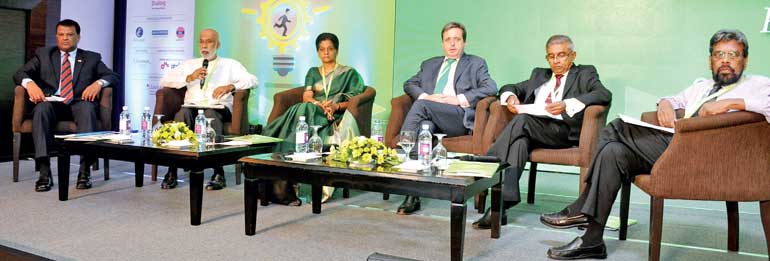Tuesday Feb 24, 2026
Tuesday Feb 24, 2026
Thursday, 4 August 2016 11:23 - - {{hitsCtrl.values.hits}}

From left Kelani Valley Plantations Managing Director Roshan Rajadurai, Ceylon Chamber of Commerce Past Chairman Dr. Anura Ekanayake, Export Development Board Chairperson Indira Malwatte, Duxton Asset Management Managing Director/ Chief Investment Officer Desmond Sheehy, CIC seeds CEO Waruna Madawanarachchi and Science Land Chairman Dr. Romesh Dias Bandaranaike
By Devin Jayasundera Technology-enabled private investment is the way forward to resurrect Sri Lanka’s failing agriculture industry according to a top foreign investor in the country’s agriculture sector. Duxton Asset Management Managing Director and Chief Investment Officer Desmond Seehy revealed that the country’s agriculture sector suffered mainly due to inadequacy of capital and highquality infrastructure. He added that a lack of qualified people with specialised expertise in agriculture was another factor hindering the sector’s growth.
Echoing similar sentiments, Export Development Board Chairman Indira Malwatte said most agriculture graduates did not return to their original fields and opted to work in places like banks instead. This led to a huge waste of knowledge and expertise, according to Malwatte. She also added that large-scale commercial agriculture was necessary but at the same time small-scale farmers should be provided with the necessary technology and linked up with exporters to ensure high-quality production. CIC seeds Chief Executive Officer Waruna Madawanarachchi stated that 28% of the country’s workforce participated in agriculture despite low levels of productivity. “One-third of the population contributes to one-tenth of the economy,” said Madawanarachchi. In the panel discussion it was revealed that many turned to agriculture as a last resort in their quest to find a suitable job. “A person becomes a farmer by default. When you don’t have a defined profession you become a farmer,” said Madawanarachchi. “In a nutshell the country’s domestic food sector can be described as small-scale scattered holdings with low productivity.” Madawanarachchi stressed that the private sector should strive for full ownership of total supply chain agriculture as it would enable a higher economics of scale and quality assurance. Kelani Valley Plantations Managing Director Roshan Rajadurai, highlighting the success of private sector involvement in the agriculture sector, said: “Currently, from the time of privatisation we have only 81% of the land we took over with over 53% of the workers at that time.
We have improved our production more than 40% and our yield has also increased by 36%. This is in spite of our workers producing the lowest individual output in the world.” He added that Sri Lanka pays the highest wages in comparison to comparable economies. In tea production 60%-70% of the cost of production was directly labour-related. “One of the key challenges we are facing is a low level of productivity and a high cost of labour,” said Rajadurai. In the 1990s we sold a kilo at $ 1.2 and even after 35 years we are still selling a kilo of tea at less than $ 3 at the Colombo auction. whereas while the labour wage at that time was Rs. 12 it has now gone up to Rs. 630.” Regional plantation companies, recognising the magnitude of this issue, intend to discard the colonial attendancebased wage model and instil a productivity- based paying system. But undue political influence by certain individuals who prefer the previous system induces a severe strain on the successful management of a plantation, Rajadurai stated. He went on to assert that with the Government recently banning the use of weedicides in agriculture, plantation companies were facing an uphill battle trying to keep burgeoning costs down.
“This ban has compounded the problem because without weedicides we cannot fertilise. And without fertilisers there’s no crop. And without crops our costs are going up,” said Rajadurai. In reference to the Government’s efforts to modernise the sector, Export Development Board Chairman Indira Malwatte explained that the EDB has taken an extra initiative in branding its agriculture products. “The Ceylon brand should be copywritten and used for other agriculture products to convey quality and freshness. However, it is not certified anywhere. When we tried to get Ceylon cinnamon we encountered this problem.” She added that the food and vegetable exporters association had requested to brand their pineapples as ‘Ceylon Pineapples’.